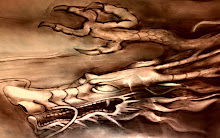OR: Nadeemy finds a sarcasm-free moment to reflect on China!
China is on the tip of everyone’s tongues – if it’s not talk about the impact this giant is having on the global economy, it’s talk about how it will be received by the international community come the Olympics. “Foreigners” who have already visited China, often leave talking about nothing more than its pollution, the filth of public latrines, the commerce push of its mega-cities, and a few of the great sites. But this is the inaccessibility of the China experience. Without language, without time, and without the willingness to debase a huge and unexpected array of beliefs, I doubt China could be much more. After all, how does one get past years of constructed orientalism, mountains of cheap goods, and the frightening largesse of the statistics, when any single one of these factors is immensely overwhelming?
It is my experience that it is extremely difficult to integrate into Han Chinese culture. Han Chinese tend to circulate in small, closed communities, and are often unwilling to share, or of the mindset that they have nothing to share (other than culinary delights and a few historical sites) with visitors. This trend is only exemplified if one digs into the archives of insular Chinese politics, and takes into consideration the long history of xenophobic and protectionist policies, and the fact that no foreigner can ever hope to become a citizen of China.
Due to an unresolved inner conflict between my eastern and western halves, my father and mother, Asian life and Australian life, it has become very hard for me to speak out against the relentless barrage of ignorant prejudices about China and its people. Indeed, not to speak is the Asian way. To my own discredit, I confess that I constantly reduce myself to entertaining other foreigners with anecdotes about cultural mishaps, and cheap talk of bizarre and untoward differences.
Yet in reality, the transformation in my awareness drawn from Chinese life, has been something innately wondrous and magical. I have been drawn in by the intimate flow of life in the streets, and the joy in making small discoveries. The fleeting moments hidden around every corner, the tiny marketplaces in back alleys, the movement in the hutongs, the red lanterns on snow, the chaotic jumble of bicycles and carts, the worlds within worlds, and the innate calmness of a people who give each space, despite the crowds. But more significantly, I am seduced by the way China is deconstructing and reconstructing me conceptually.
To comprehend anything at all about China, one has to begin by knowing that not only the language, but the mindset and approach to life, are unknown to the western mind. European language concepts are not applicable in Chinese; words only cover parts of meanings, and new meaning take a long, long time to understand. But perhaps the most striking aspect of the Chinese experience is the result of being so firmly outside the sphere and influence of Christianity; to be momentarily free of the intense individualism and egocentrism of nations harvested on the belief that each of us stands alone to be judged before God.
Living inside an empire of communities which devalue the individual so entirely is mind-blowing. On one hand, I will always be conflicted, as I can not cease to believe in the rights and the power of the individual; yet, on the other hand, China has brought me to see clearly the negative offshoots of western individualism. As incredulous as it may seem, many of the “ills of the west” (depression, anxiety, and eating disorders such as anorexia and bulimia) do not exist in Chinese civilization, and are most definitely not treated, diagnosed or authenticated in the same way. I take the viewpoint now, that these ills only exist in personal belief, stemming from a negative egocentrism cradled by social validation.
So to end my artless musings, let me say there is nothing more fantastic than the risk of being shaped and changed in an unimaginable way, and to have every idea one has ever been fool enough to believe in discredited. And of China, that the strength of this nation is undeniable, and lies not in its government, but in the millions of people who believe more in the greatness of this central kingdom than themselves.
*










































